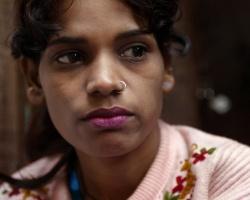Many young women want a way out, a way out of having to sell their bodies daily; but in this huge Indian city of 22 million, exit routes aren’t plentiful for victims of sex trafficking.
Prostitution and human trafficking are thriving businesses in Mumbai. The International Justice Mission estimates between 600,000 and 800,000 men, women and children are trafficked annually. Thousands of women who are trafficked from all across India disappear into the black hole of a brothel where they are controlled by pimps. All castes in Indian society look down on these women, giving them little chance for escape. Even if they do leave this life behind them, they carry a social stigma for the rest of their lives.
An Indian pastor in Mumbai has a heart to reach out to these women: He and his church members currently are building positive relationships with women in brothels. Soon, the church will open an aftercare shelter to help these women make a fresh start. The church’s shelter will be able to accommodate 10 women and one house mom. Some women will leave the brothels of their own accord, but some will need to be rescued.
The rehabilitation process will give these women access to counseling and job training. More importantly, the women will hear of Jesus’ great love for them. Multiple government shelters for former prostitutes exist, but they don’t provide the redemptive gospel message along with rehabilitation, Regina Seabolt* says. Seabolt and her husband Kaleb* are Christian workers in South Asia. The Seabolts partner with a local network of believers to reach women in brothels.
“We are passionate to see the local Indian church rise up to meet the needs of injustice in their city—reaching out both to mend the wounds of those abused and offer the gospel of hope with the millions of perpetrators that keep these women and children in the grip of slavery,” Seabolt says.
Sadly, many women who are rescued return to prostitution, Seabolt says, because that life is all they know. They also can make more money working as prostitutes than working minimum-wage jobs. However, spiritual transformation makes returning to prostitution less likely.
“You can rescue a girl or boy, but if you don’t get them the gospel, they are still in captivity,” Seabolt says. “Bible study will be regular, and the home will be run by believers; so the major prayer is that some [usually only a minority] will become believers and stay out and not return to prostitution.”
In addition to regular Bible studies, the rescued women also will receive skills and job training. The Seabolts and national believers currently are discussing what that might look like. Seabolt said the first several months will be lessons in basic survival: how to wash clothes, how to spend time wisely and how to live in a Christ-centered community. Later, the women will receive biblical counseling and an education in domestic job training, all in a holistic approach to providing healing and freedom in Christ. The women also will be given medical care as statistics suggest about 80 percent of prostitutes are HIV positive.
“Our heart is to offer an aftercare center that, through the partnership of the Indian and American church, can meet the immediate and long-term needs these women will face for the rest of their lives,” Seabolt says.
The shelter will meet these needs through spiritual healing, healthcare, education, social re-entry and a community of fellowship and hope. The network of national and local Baptist churches has purchased a building to serve as the shelter. Funding for the building came from the church network, as well as through OneLife, which provides opportunities for students to serve in ministry overseas.
Donations through OneLife have paved the way for opening and supplying this shelter. OneLife supporters recently furnished the entire shelter with water filters, kitchen utensils, mattresses, pillows, chairs and all the things it needs to make it a true home. The first of the 10 women is expected to arrive by late summer or early fall of this year, Seabolt says.
Between now and then, Indian believers continue to furnish the shelter with other necessities such as toilets, refrigerators, closets and beds. Seabolt says short-term mission teams from OneLife will have the opportunity to provide these women with counseling and job training. This fall, a short-term team from Florida will be ministering alongside Indian believers in the women’s shelter. The Florida church already has invested financially through OneLife, yet funding is still a great need.
“Right now, the biggest needs are funding to undergird the home itself, skills training for the pastors running it and a powerful outpouring of prayer,” Seabolt says. “[Pray] that the 10 women the Lord has chosen for this home will have an openness in their hearts to receive the grace gift of salvation, redemption, healing and freedom that come through Christ alone.”
Students or churches that want to be involved can learn about this ministry through OneLife’s One Women’s Shelter advocacy project. OneLife connects students to volunteer opportunities with this Indian church. Visit OneLifeMatters.org to learn how you can pray, donate or volunteer.
*Indicates changed names.




